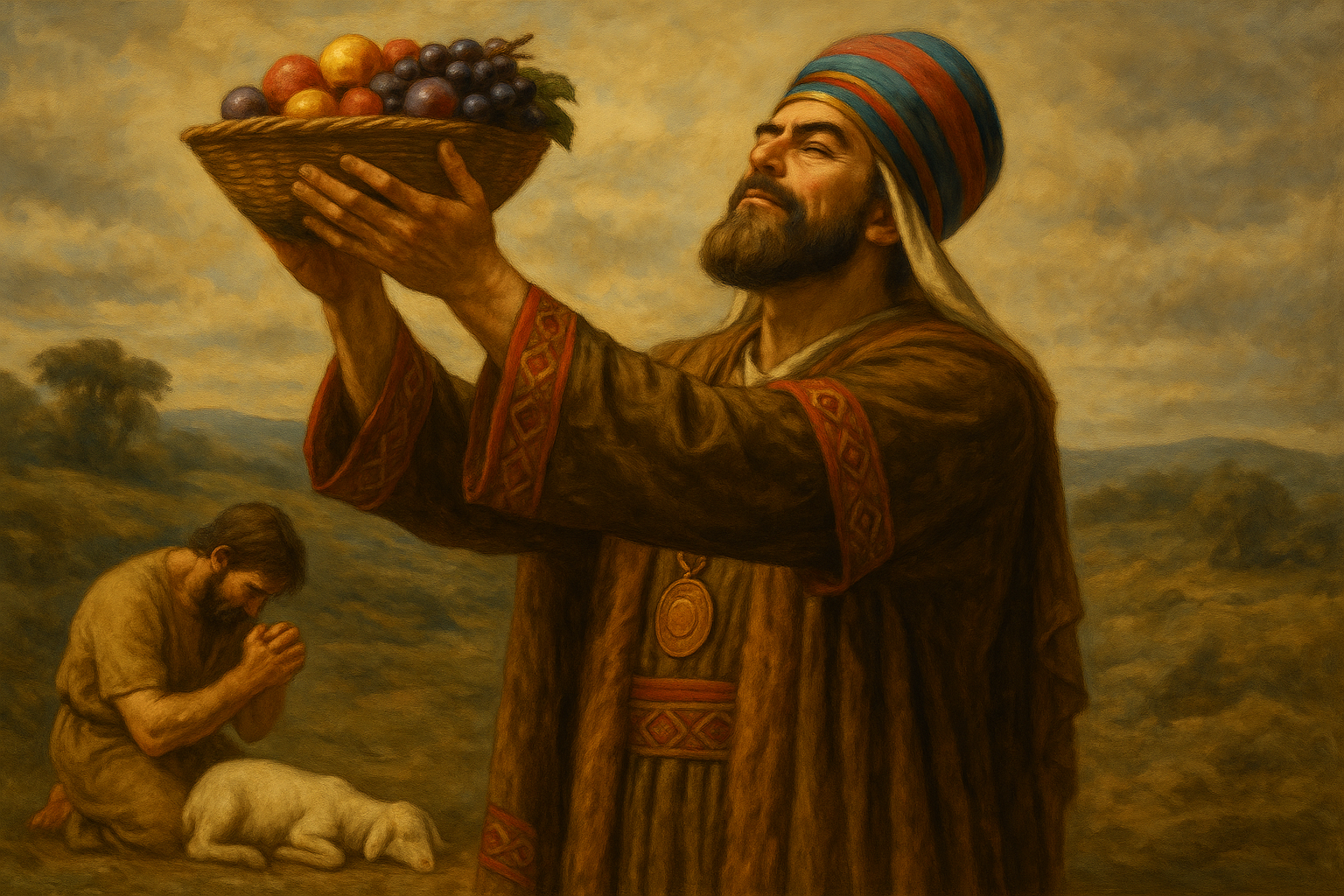Bring the Lamb, Not the Fruit.
Cain the Pharisee & Abel the Sinner
If I’m honest, I’ve had seasons where I came to God with a full basket—good works, gratitude, generosity—and still felt… off.
Ever been there?
Like something was missing?
Like the songs were sung, the prayers prayed, the checklist complete—but the offering didn’t land?
That tension isn’t new. It’s as old as Genesis.
It’s the tension between Cain and Abel.
And Jesus reframes it later in His parable of the Pharisee and the Tax Collector.
Two different scenes. Same issue:
One brought a DIY version of worship. The other brought what God required.
1. Not All Offerings Are the Same
Genesis 4:3–5 says both brothers brought an offering to the Lord.
But there’s a hidden layer here:
Cain brought fruit from the ground—which in Levitical law would later be known as a thanksgiving offering.
It wasn’t wrong by category—it just wasn’t right for the moment.
Abel brought the firstborn of his flock, a blood offering, a sacrifice.
This wasn’t just symbolic—it was prophetic. It pointed forward to the kind of offering God accepts for covering sin.
So when God “had regard for Abel’s offering, but not Cain’s,” it wasn’t favoritism—it was alignment with His will.
Some scholars argue Cain had access to animals but chose not to bring one. Others say his heart posture polluted the gift. Either way:
He brought something God hadn’t asked for—and expected it to be accepted.
That’s the definition of DIY worship.
2. The Pharisee Brought Fruit Too
Fast forward to Luke 18.
Jesus tells a story about two men who go to the temple to pray.
The Pharisee doesn’t ask for mercy. He thanks God for how good he is.
He’s not a liar. He fasts. He tithes. He’s moral.
But his prayer is basically a thanksgiving offering—full of fruit.
The Tax Collector, meanwhile, beats his chest and begs:
“God, have mercy on me, a sinner.”
There’s no offering of fruit here. No track record. Just repentance.
And Jesus says: That man—the one with nothing but need—went home justified.
Just like Abel.
3. The Trap of DIY Worship
This is where it hits home for me.
Cain didn’t reject God—he just customized the terms.
He said, in essence:
“God, I’ll bring You something good. Something from my labor. Something I’m proud of.”
And that’s what so many of us do.
We treat God like a client we’re pitching to:
“Look at my creativity. My success. My discipline. My theology. My gratitude. My tithes. My art.”
But God isn’t impressed by fruit that replaces the lamb.
DIY worship is when we try to replace sacrifice with sincerity,
obedience with effort,
God’s terms with our ideas.
It’s worship without surrender.
And it’s still rejected.
4. Worship That Costs Something
Let’s not forget: Abel’s lamb bled.
His worship cost him something.
Not just effort—but sacrifice.
It wasn’t symbolic. It was surrender.
The lamb didn’t just represent his devotion—it bled for it.
The tax collector’s prayer cost him too.
His pride. His image. His place in the room.
He beat his chest because his heart was already broken.
Cain’s didn’t.
He brought fruit—clean, curated, something he worked for.
But it didn’t cost him anything that would challenge his ego.
The Pharisee’s didn’t.
He brought his résumé.
Gratitude without repentance.
Confidence without confession.
That’s the difference.
One came empty and was filled.
The other came full and walked away empty.
And here’s something I’ve come to realize:
Worship that doesn’t bleed might not have bowed.
If your offering never carries a wound, it might still be waiting at the altar—never truly surrendered.
God isn’t just looking for what you produce.
He wants what hurts.
What humbles.
What bleeds.
He wants the parts we’d rather keep hidden.
Because the altar was never meant to hold our polish.
It was built to receive our pain.
5. So What Am I Really Offering?
Sometimes I wonder if God looks at my “fruit basket” of work and whispers,
“It’s nice… but where’s the lamb?”
Have I brought Him gratitude without repentance?
Activity without intimacy?
Sincerity without sacrifice?
God is still seeking Abels and Tax Collectors—the ones who come low, come empty, come real.
Reflection Questions
Am I bringing what God desires—or just what I’m good at producing?
Have I confused thankfulness with transformation?
What would it look like to offer God the “lamb” in this season of my life?
Prayer
God,
I don’t want to customize worship.
I don’t want to offer fruit when You’ve asked for the lamb.
Forgive me for sincere offerings that dodge obedience.
For gratitude that ignores surrender.
For worship that costs nothing.
Make me more like Abel.
More like the tax collector.
Honest. Dependent. Sacrificial.
And always in need of Your mercy.
In Jesus’ name,
Amen.

